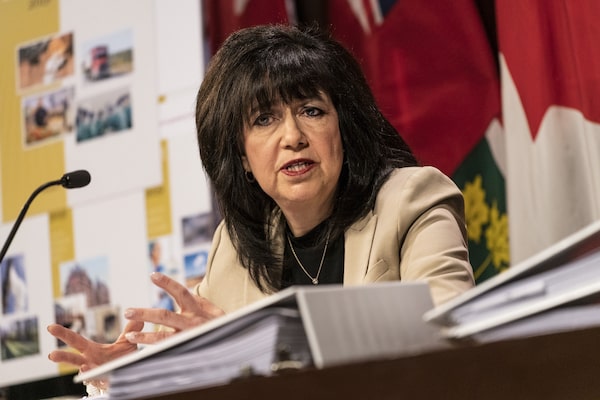
Ontario Auditor-General Bonnie Lysyk speaks during a news conference at Queen's Park in Toronto on Dec. 4, 2019.Aaron Vincent Elkaim/The Canadian Press
Ontario’s Auditor-General says the province’s real estate regulator has been ineffective in policing the multibillion-dollar residential property industry.
In a report released on Wednesday, Auditor-General Bonnie Lysyk found the Real Estate Council of Ontario (RECO) does not adequately ensure that the industry complies with the regulations and has failed to do enough to protect consumers.
Topping the Auditor-General’s list of concerns was the fact that RECO does not fully inspect real estate brokerages on a timely basis. The Auditor-General found that 27 per cent of registered brokerages have never been fully inspected.
Ontario’s planned land changes redesignate thousands of hectares against the will of local councils
As well, the Auditor-General said RECO does not have a consistent process to assess those applying to be realtors and who say they have a criminal history. The report looked at a sampling of 25 professionals who had disclosed a criminal conviction or charge and found that RECO had approved 20 of them and did not provide any documented reasoning for why it did so.
RECO was also criticized for how it deals with ethics violations in real estate transactions. The report said the average fine imposed on realtors was often below the amount of the commission they earned in a transaction, and said the fine could be viewed as a cost of doing business instead of a “sufficient deterrent to future misconduct.”
RECO said it is committed to developing a plan that will address the Auditor-General’s concerns. RECO’s response was included in the Auditor-General’s 51-page report. Under the province’s real estate act, every real estate brokerage, broker and realtor must be registered with RECO.
The Auditor-General identified a host of other shortcomings ranging from RECO’s failure to track and analyze complaints, which would help it identify and address systemic problems, to a lack of protocols to ensure that students do not cheat on virtual real estate exams.
The report said one glaring lack of enforcement occurs after RECO inspectors discover a brokerage is violating rules. The regulator rarely follows up “to confirm that the brokerage has addressed the violations,” the report said.
The report also noted that RECO does not have a process to inspect whether real estate professionals are complying with anti-money-laundering laws.
“It is probable that money laundering is occurring undetected in Ontario’s real estate market,” Ms. Lysyk said in a press release accompanying the report.

During the pandemic real estate boom, blind bidding was heavily criticized for contributing to the spike in home prices when properties sold for hundreds of thousands of dollars over the listed price.Lars Hagberg/The Canadian Press
Realtors and brokers are required to report suspicious and large cash transactions to the Financial Transactions and Reports Analysis Centre of Canada (FINTRAC), which monitors money laundering.
But over the past five years, when more than one million Ontario properties worth $760-billion were sold, hardly any transactions were reported to FINTRAC. The federal agency received no reports of large cash transactions from 2017 to 2020. Only last year, which was a record period for home sales, FINTRAC received 18 reports of large cash transactions, according to the Auditor-General.
The report recommended that RECO work with FINTRAC to share information. It also recommended that RECO update its procedures to ensure that brokerages’ reporting obligations are properly reviewed.
RECO said it had already begun to “explore opportunities” to share information and collaborate with FINTRAC.
Over all, the Auditor-General had 25 recommendations for RECO and the Ministry of Public and Business Service Delivery, which oversees the regulator. In the report, both RECO and the ministry said some of the recommendations would be addressed next year when the province’s new real estate rules go into effect.
That law includes a purported change to an opaque real estate sales tactic known as blind bidding, where competing buyers in a multiple-bid situation do not know what others are offering to pay for a home.
During the pandemic real estate boom, blind bidding was heavily criticized for contributing to the spike in home prices when properties sold for hundreds of thousands of dollars over the listed price.
The real estate industry has repeatedly defended the practice as giving homeowners choice. The new law, which comes into effect in April, includes a provision that will allow the homeowner to disclose the competing offers. However, homeowners are already allowed to sell their homes via an open auction.
The Auditor-General report recommended that RECO work with its overseeing ministry to gather data on which sellers choose an auction process.
 Rachelle Younglai
Rachelle Younglai